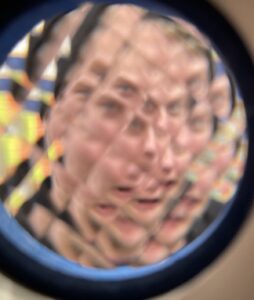 We grow in direct proportion to the amount of chaos we can sustain and dissipate. ~ Ilya Prigogine
We grow in direct proportion to the amount of chaos we can sustain and dissipate. ~ Ilya Prigogine
We are living in times of increasing chaos.
However stable our immediate lives may seem, society at large has become widely dysregulated. Things we used to take for granted – a stable government, a reliable media, a sane economy, a healthy environment, a sense that leaders are competent – are now iffy at best. Increasingly this global situation is being called the metacrisis.
We are all affected. When so much is unsettled, it’s hard to maintain calm and clarity. But how we are affected is within our power. We are not in charge, yet we are also not powerless. Amidst the upheaval is a sense of possibility about finding another way.
Between stimulus and response there is a space. In that space is our power to choose our response. In our response lies our growth and our freedom. ~ Viktor Frankl
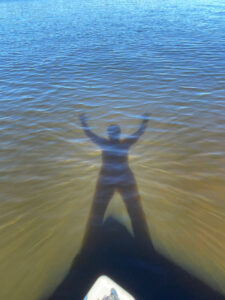 Choosing our response to the metacrisis assumes a certain agency. We have choice, but it doesn’t come easily. It takes work. To move more fully into choice means cultivating deeper capacities within ourselves. This growth, representing evolution toward greater wholeness, is the essence of our work toward Becoming the Ground: gaining self-mastery and embracing the role of being a healing force in the world.
Choosing our response to the metacrisis assumes a certain agency. We have choice, but it doesn’t come easily. It takes work. To move more fully into choice means cultivating deeper capacities within ourselves. This growth, representing evolution toward greater wholeness, is the essence of our work toward Becoming the Ground: gaining self-mastery and embracing the role of being a healing force in the world.
There is some urgency to this endeavor: Cultivating and acting from our deeper capacities is needed in the near term if we are to create a positive future. Fortunately, we are likely to find aliveness and joy in this work.
When you know who you are; when your mission is clear and you burn with the inner fire of unbreakable will; no cold can touch your heart; no deluge can dampen your purpose. You know that you are alive. ~ Chief Si’ahl (Seattle)
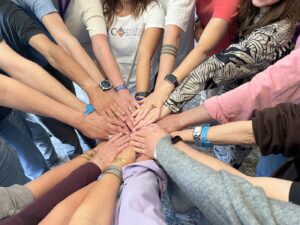 We can’t do this alone. The separateness of modernity has led to epic levels of polarization, depression, loneliness, and addiction. We’re re-learning that a supportive community and shared identity are needed to be at our best. We need to connect much more effectively, which requires us to keep developing more sophisticated relational capacities.
We can’t do this alone. The separateness of modernity has led to epic levels of polarization, depression, loneliness, and addiction. We’re re-learning that a supportive community and shared identity are needed to be at our best. We need to connect much more effectively, which requires us to keep developing more sophisticated relational capacities.
To become the ground we must expand our capacity to build collective meaning-making through deep resonance with others, including those of different views and values. The good news is that we’re wired for connection.
“There is almost a sensual longing for communion with others who have a large vision. The immense fulfillment of the friendship between those engaged in furthering the evolution of consciousness has a quality impossible to describe.” ~ Pierre Teilhard de Chardin
Just as we need to go deeper within ourselves and deeper in our collectives, we need to find deeper meaning to anchor our individual and group actions in a larger context, which we might call soul force or spirit.
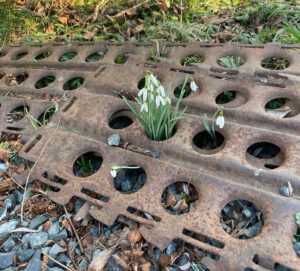 The Scottish chess master and philosopher Jonathan Rowson has suggested that we are entering a post-secular world. The fact that modern humans have yet to create systems at scale that value peace, health, justice, and sustainability reinforces our need to align with a transcendent purpose.
The Scottish chess master and philosopher Jonathan Rowson has suggested that we are entering a post-secular world. The fact that modern humans have yet to create systems at scale that value peace, health, justice, and sustainability reinforces our need to align with a transcendent purpose.
We are talking about a shift in our consciousness, a rewriting of our collective story to embrace a convivial collective future. The term “metanoia” — meaning a reset of our consciousness — is one I find useful to describe this transcendence of our normal way of being into a more awakened and whole presence.
If our species is going to grow up in this century, we are going to have to live more fully into our consciousness. ~ Krista Tippett
I consider myself more explorer than expert. What will transpire in the coming years is unknowable. There are distinct, urgent, and in many cases unprecedented risks arising at this point in history. But that doesn’t mean we shouldn’t take every chance we can to reduce suffering and to be a healing influence. This is what gave rise to the idea of “Becoming the Ground.” To me this is a deep calling, one that entails self-mastery, collective wisdom, and opening into greater consciousness. These capacities are within us all and can be cultivated through careful practice.
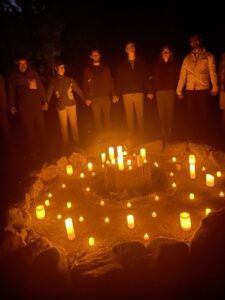 While we cannot “fix” the metacrisis, this is not a time to be passive. The Swedish author and philosopher Tomas Bjorkman has observed that we have reached a breaking point. Bjorkman suggests that whether this becomes a breakdown or a breakthrough is up to us. One vital way to meet this powerful evolutionary moment – and break through to a more convivial and sustainable world – is by becoming the ground.
While we cannot “fix” the metacrisis, this is not a time to be passive. The Swedish author and philosopher Tomas Bjorkman has observed that we have reached a breaking point. Bjorkman suggests that whether this becomes a breakdown or a breakthrough is up to us. One vital way to meet this powerful evolutionary moment – and break through to a more convivial and sustainable world – is by becoming the ground.
This piece was written as a complement to a workshop I’ve recently offered in Bellingham and Seattle, WA, and also presented at the Integral European Conference near Budapest. In future essays I’ll explore specific strategies that foster the kind of wholeness that serves our growth toward becoming the ground. Please leave a comment to help in the further exploration of this material: How do these ideas land in you?
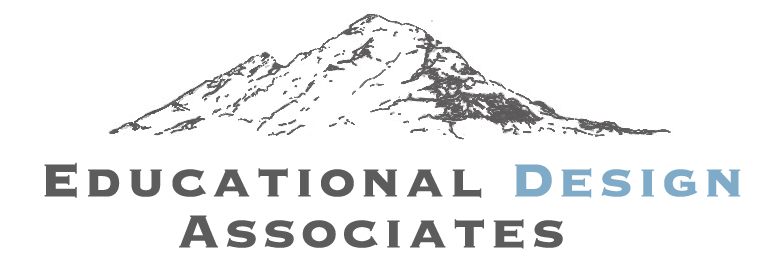
A trend towards post-secularism is the opposite of how I thought human evolution could occur. Concluding the absolute righteousness of one’s own religion creates dangerous judgmentalism, and motivates conflict rather than peaceful coexistence..
Thanks for sharing your thoughts, Allen. I completely agree that “absolute righteousness” and “dangerous judgmentalism” are threats to a peaceful world.
In recent years I have come to believe that some kind of transpersonal or spiritual connection is an essential element in being a whole human. This sort of unifying experience is not at all compatible with the kind of absolutism that you rightly decry.
I’ll write more about my growing understanding of spirituality in a future piece.
Briefly, though, what I believe we are evolving beyond is the false choice between rigid secularism and dogmatic faith. In this emergent new sort of humanity, the role of some form of spiritual attunement is to help us find what we have not yet found: a way to manage human affairs, at scale, that is convivial, humane, sustainable, and just.
Again, thanks, Allen, and I’d love to see other wise voices weigh in on this!